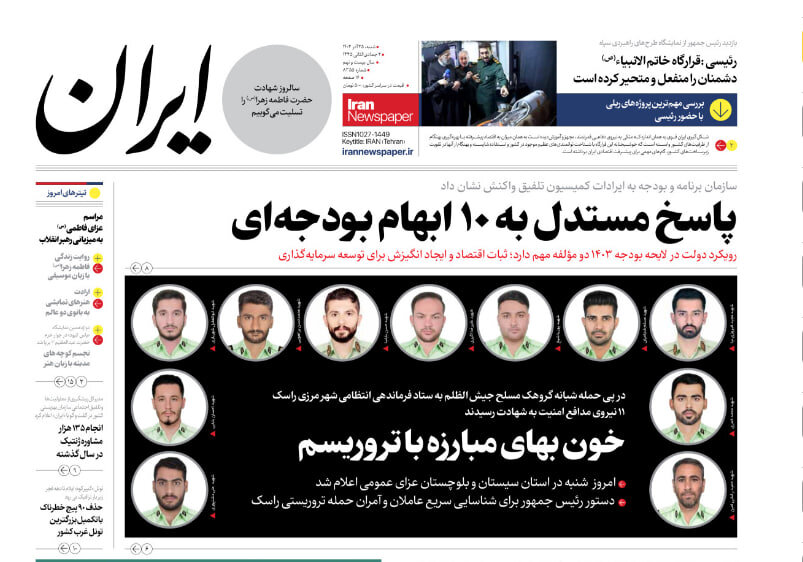Diplomatic consultations and emphasis on Iran's opposition to the displacement of Palestinians

In an analysis, the Iran newspaper dealt with the Iranian foreign minister's visit to Geneva to participate in the second meeting of the World Refugee Forum and wrote: The policy of forced migration of the people of Gaza is considered the most important agenda of the decision-makers in Tel Aviv.
Recently, Amir Abdollahian stated that "the ultimate goal of the fake and occupying Israel is the forced migration of the residents of Gaza and the West Bank to the Sinai region in Egypt and parts of Jordan. Tel Aviv is trying to establish a Palestinian state outside the historical land of the Palestinians, but the resistance has become the main obstacle to realizing the disturbed dreams of the Zionists." Amir Abdollahian also emphasized that the Israeli regime, by not achieving its goals in the two-month war against Gaza, with massive killings, the complete siege of Gaza and the escalation of crimes in the West Bank, is seeking to displace the Palestinian people from Gaza and the West Bank. Islamic countries must use all their strength to support the Palestinian nation. Amir Abdollahian considered the recently approved resolution of the UN General Assembly condemning Israel's attacks as a strong message for establishing a ceasefire.
Shargh: China supports the development of relations between Iran and Saudi Arabia
In a commentary, Shargh discussed the development of relations between Iran and Saudi Arabia and China's support to strengthen the relations between the two countries and said: Chinese Foreign Minister Wang Yi met Ali Bagheri Kani, Deputy Foreign Minister of the Islamic Republic of Iran, and Waleed Al-Khuraiji, Deputy Foreign Minister of Saudi Arabia. He noted that Beijing supports the countries of West Asia in their efforts towards national development, solving security problems through dialogue and advancing the development of relations between Tehran and Riyadh. In addition, China would like to use this trilateral meeting as an opportunity to raise the level of friendship between the Islamic Republic of Iran and Saudi Arabia and develop stability and security in the West Asia region. The representatives of Tehran and Riyadh emphasized that the "Beijing Agreement" opened a new chapter of China's efforts to play a constructive role in the Middle East. The relations between Iran and Saudi Arabia are moving in a positive direction and the two sides will continue to develop economic and commercial cooperation in the fields of security and cultural exchanges, joint achievement of security, stability and regional development.
Vatan-e-Emrooz: The high-speed train railway projects
In an article, Vatan-e-Emrooz addressed the country's railway project and wrote: Strengthening the country's corridor capacity was defined under the "Iran-Rah" project in the Ministry of Roads and Urban Development, which is being pursued. Due to its special geopolitical position, Iran can be the linking point of Central Asia countries to the open seas and East Asia to Europe. One of the most important projects was the completion of the North-South corridor. It was so important for Iran that the agreement on the construction of the Rasht-Astara railway was made with the presence of the presidents of Iran and Russia in a video conference at the beginning of this year. Strengthening the Pakistan-Iran-Turkey route, the Shalamcheh-Basra railway route, as well as the Chabahar-Zahedan railway and the connection of the Sea of Oman and the Persian Gulf to Europe are other programs being pursued to strengthen the transit position of the Islamic Republic. The president explained the importance of speeding up the implementation of railway projects to actualize the transit capacities and improve the geographical position of our country in the way of regional and international corridors. He also emphasized the importance of "observing both speed and quality" in the implementation of these projects.
Arman-e-Melli: America's messages have no end
In an article, Arman-e-Melli newspaper investigated the American security messages to Iran. It wrote: The United States does not send messages to Iran only in the nuclear case. Apparently, the list of America's messages to Iran is more than what is imagined. America is sending a message to Iran regarding the nuclear issue, Hamas, the non-expansion of conflict in the region, and the security of the Red Sea. The sending of these messages from the U.S. to Iran is not just an analysis, but news that is reflected in the media. Of course, the issue of sending messages is not just a warning, but these requests are sent to Iran by the United States of America in line with its security approach to the world and especially to West Asia. The goal is clear, the United States knows that in the region, based on Tehran's security movements, security depends on Iran's behavior.
Leave a Comment